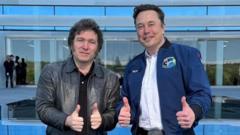As Javier Milei celebrates one year as Argentina's libertarian president, his pursuit of economic revival sparks conversations in the U.S. about similar governance philosophies, notably influencing figures like Elon Musk and Donald Trump.
Milei's primary objective has been to curb government spending in a country riddled with fiscal challenges. Surprisingly, his tough austerity measures, which include significant cuts to public spending, have not diminished his popularity, with recent polling showing over half of Argentines still supporting him. This figure mirrors Donald Trump’s current standing among U.S. voters following the recent presidential elections. Trump has even dubbed Milei as a leader capable of "making Argentina great again," while Musk describes the improvements in Argentina under Milei's rule as "giant."
Milei's reputation in the U.S. largely hinges on his deregulation initiatives, appealing to activists aspiring for a leaner government. His economic strategies have included reducing subsidies and slashing government ministries in half. Notably, he is pushing for the privatization of major state-run firms, including the national airline, Aerolineas Argentinas.
Musk, who is likely to play a pivotal role in the incoming U.S. administration, envisions analogous cuts in federal regulations and expenditure. He has suggested trimming federal spending by about $2 trillion, similar to Milei's approach in Argentina. Musk admires Milei's "fantastic job" in dismantling bureaucratic structures, wishing to emulate that success in the U.S.
Yet not everyone shares this enthusiasm. Experts like Monica de Bolle caution against applying Milei's Argentine tactics to U.S. governance, claiming the distinct socio-economic contexts make such parallels tenuous. Argentina's history of fiscal mismanagement necessitated Milei's measures, contrasting sharply with the political landscape in the United States.
While Milei's policies resonate more with Musk's small-government ideals, they may not align seamlessly with Trump's populist nationalist agenda, which requires substantial governmental involvement in defense and immigration. This divergence in economic vision suggests potential fractures within the current U.S. leadership's approach.
Milei continues to engage in the regional trade discussions as a free trader, advocating for flexibility within Mercosur on trade agreements with external partners. Conversely, Trump has been known to bolster U.S. jobs through negotiated agreements like the USMCA, positioning them antithetically in terms of international trade approaches.
Both leaders find common ground in their cultural criticisms, but their financial ideologies illustrate an understated rift. With Milei holding a divisive stance domestically, the political future remains uncertain. As he prepares for midterm elections in October 2025, both public opinion and the effectiveness of his radical economic reforms may shape his leadership's duration and legacy.





















